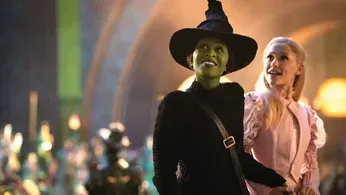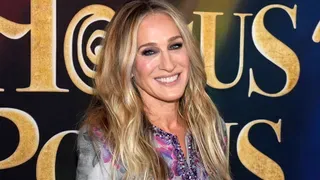
Jan 23
Contentious 'Emilia Pérez' Leads Queer Titles at This Year's Oscar Nominations
Robert Nesti READ TIME: 7 MIN.
The queer experience was present at the Oscar nominations this morning in the presence of Bowan Yang, who read the nominees along with Rachel Sennott in the early morning presentation.
As for queer presence in the nominations? Well, less than anticipated. There were numerous snubs, but more on those later. And the film with the most nominations – Netflix's "Emilia Pérez" with a whopping 13 – is a queer film with many distractors within the community. Conversely, the GLAAD Media Awards dropped their nominations on Wednesday and shut the title out. Friday Jan. 17, 2025 - Los Angeles - GALECA: The Society of LGBTQ Entertainment Critics was more lukewarm to "Emilia Pérez," giving it seven nominations in their recently award Dorian Award nominations.
But at the Oscars, "Emilia Pérez" ruled, leading the pack with the most nominations, including a ground-breaking one for its titular character, played by Karla Sofía Gascón, who is the first openly trans actress to receive an Oscar nomination. It also received nods for Best Picture, Best Director (Jacques Audiard), Best Adapted Screenplay (Jacques Audiard), Best Supporting Actress (Zoe Saldaña), ,Best International Feature (France), two for Best Original Song ("El Mal" and "Mi Camino"), Best Original Score, Best Makeup and Hairstyling, Best Editing, Best Sound, and Best Cinematography.

The queer criticism of "Emilia Pérez" comes from it being a "profoundly retrograde portrayal of a trans woman," according to an essay published by GLAAD earlier this year. While noting the film's success with critics and with the Cannes judges (it won the Jury Award for Best Film and a Best Actress nod shared by Gascón, Saldaña and Selena Gomez), the essay contends "critics who are focused on the film's trans representation tell a very different story"; and go on to quote a number of them. Here is a sample:
"'Emilia Pérez's' screenplay is so cisgender it's almost satirical. In fact, its the single biggest indicator of Audiard's gender identity. He might as well have the word "cis" tattooed on his forehead," writes Amelia Hansford in PinkNews.
In an open conversation about the film, trans critics for Them James Factor and Fran Tirado argue as to the film's worthlessness. "Anyway, I think 'Emilia Pérez' is symptomatic of a trend I've noticed in filmmaking in the first half of this decade (oh God): movies that are just OK or actively bad, but come dressed in all the trappings of 'prestige.' I probably would have adored 'Emilia Pérez' if it had actually been a schlocky B movie (and committed to being that) instead of a glossy production that then gets stuck somewhere between camp and self-seriousness," writes Factor. Tirado compares the film to "Mrs. Doubtfire," writing that the films have the "same plot" and then adds: "It is an idea of transness so completely from the cis imagination. [emphasis added] If the film had instead realized, "No, Emilia really is the villain," and she kept on with her bad behavior, maybe murdered more people, spun out of control, fed her own absurdity – now that's the movie I signed up for!"
And Kendall Cunningham writing in Vox headlines with "'Emilia Pérez' is a regressive movie that thinks it's woke. It will probably win an Oscar." She then writes: "Still, 'Emilia Pérez's' presence in the Oscars race isn't exactly a shock, given that it falls neatly into a category of movies the white Hollywood establishment loves to celebrate: mawkish stories about people on society's margins that allow viewers to feel socially aware through their consumption, without challenging of any of the stereotypes and political messaging presented in them. Could 'Emilia Pérez' become this year's 'Crash?'"

The second queer title cleaning up with Oscar nods is "Wicked," the hugely successful adaptation of the first-half of the long-running Broadway hit, which saw nods for Best Picture, Best Actress (Cynthia Erivo), Best Supporting Actress (Ariana Grande), Best Production Design, Best Costume Design, Best Makeup and Hairstyling, Best Original Score, Best Film Editing, Best Sound, and Best Visual Effects. It was expected to do well with the Academy, and could win Best Picture, though the consensus is that would be jumping the gun since it is only one-half of a story that concludes when the second half, "Wicked: For Good," premieres next November. And missing from the nominees is Jonathan Bailey, whose turn as the boy-bandish prince who is the love interest for Erivo and Grande was on many short-lists for a nominee for Supporting Actor. He also may have to wait until next year.
The third film with queer presence to receive multiple noms is the trending indie "Sing Sing," which saw another Best Actor nod to Colmon Domingo, who plays an incarcerated man who gains his confidence to seek justice by becoming a stage performer as part of a prison program. This marks the second consecutive year Domingo is nominated in this category (last year he was up for playing Bayard Rustin in the biopic "Rustin." The film was also nominated for Best Original Song – "Like a Bird," and Best Adapted Screenplay. But missing was the hoped for nomination for Domingo's co-star, Clarence Maclin, who is a graduate of the prison program depicted in the film and plays a fictionalized version of himself. He has received nominations for Best Supporting Actor at the BAFTA Awards, Critics' Choice Movie Awards, Gotham Awards, and Independent Spirit Awards. But he did receive a nomination as part of the film's screenwriting team.

The major queer snubs come from the two films directed by out Italian filmmaker Luca Guadagnino for two films he released this year: the enormously successful "Challengers" and the still-to-be-determined (and harder sell) "Queer." The biggest snub for "Challengers" is for Best Score. Trent Reznor and Atticus Ross' propulsive soundtrack has been a big hit with audiences (and gyms everywhere), but apparently not with the academy. And the film itself has the kind of popularity that should have propelled it onto the Best Film list. Many were expecting at least one nomination for "Queer" – for Daniel Craig for his meticulous and very funny take on novelist William Burroughs, but it didn't happen. Nor did Guadagnino get it for Best Director or his talented screenwriter Justin Kuritzkes, who wrote both films.
Certainly to be pointed out as a major snub is the exclusion of "Will and Harper" from the Documentary category. The Netflix doc follows actor Will Ferrell on a road trip across America with his friend and former Saturday Night Live writer Harper Steele after Steele has transitioned. The film had been shortlisted in the category, but did not make the grade.
And the great queer director Pedro Almdodovar, an Oscar favorite, received no love for his first English language film, "The Room Next Door," despite acclaimed performances from Tilda Swinton and Julianne Moore in a wrenching drama about end-of-life issues. Also not getting much love are such gay-adajacent actors as Angelina Jolie in a memorable turn as Maria Callas in "Maria;" Nicole Kidman as a sexy cougar in "Babylove;" Selena Gomez as the spoiled wife of the cartel leader in "Emilia Pérez," and both Pamela Anderson and Jamie Lee Curtis, who had some late momentum for "The Last Showgirl." Queer adjacent "Conclave" did reasonably well, receiving eight nominations including Best Picture, Best Actor (Ralph Fiennes), Best Supporting Actress (Isabella Rossellini), and best adapted screenplay; but director Edward Berger was snubbed, along with such potential supporting actors as John Lithgow and Stanley Tucci. And while "The Substance" did surprisingly well, its co-star Margaret Qualley was not nominated. But who was nominated in the Best Supporting Actor category is Jeremy Strong, the British actor and "Succession" alum, whose turn as Donald Trump's legal henchman, lawyer Roy Cohn, in "The Apprentice" again shows that real-life evil gay can be the fodder for a great performance.
Robert Nesti can be reached at [email protected].







